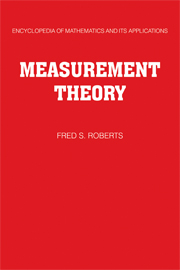Book contents
- Frontmatter
- Contents
- Editor's Statement
- Foreword
- Preface
- Measurement Theory
- Introduction
- Chapter 1 Relations
- Chapter 2 Fundamental Measurement, Derived Measurement, and the Uniqueness Problem
- Chapter 3 Three Representation Problems: Ordinal, Extensive, and Difference Measurement
- Chapter 4 Applications to Psychophysical Scaling
- Chapter 5 Product Structures
- Chapter 6 Nontransitive Indifference, Probabilistic Consistency, and Measurement without Numbers
- Chapter 7 Decisionmaking under Risk or Uncertainty
- Chapter 8 Subjective Probability
- Author Index
- Subject Index
- Frontmatter
- Contents
- Editor's Statement
- Foreword
- Preface
- Measurement Theory
- Introduction
- Chapter 1 Relations
- Chapter 2 Fundamental Measurement, Derived Measurement, and the Uniqueness Problem
- Chapter 3 Three Representation Problems: Ordinal, Extensive, and Difference Measurement
- Chapter 4 Applications to Psychophysical Scaling
- Chapter 5 Product Structures
- Chapter 6 Nontransitive Indifference, Probabilistic Consistency, and Measurement without Numbers
- Chapter 7 Decisionmaking under Risk or Uncertainty
- Chapter 8 Subjective Probability
- Author Index
- Subject Index
Summary
Measurement
A major difference between a “well-developed” science such as physics and some of the less “well-developed” sciences such as psychology or sociology is the degree to which things are measured. In this volume, we develop a theory of measurement that can act as a foundation for measurement in the social and behavioral sciences. Starting with such classical measurement concepts of the physical sciences as temperature and mass, we extend a theory of measurement to the social sciences. We discuss the measurement of preference, loudness, brightness, intelligence, and so on. We also apply measurement to such societal problems as air and noise pollution, weather forecasting, and public health, and comment on the development of pollution indices and consumer price indices.
Throughout, we apply the results to decisionmaking. The decisionmaking applications deal with transportation, consumer behavior, environmental problems, energy use, and medicine, as well as with laboratory situations involving human and animal subjects.
In this introduction, we try to give the reader a quick preview of the contents and organization of the book, and of the problems we shall address. The reader might prefer to read the introduction rather quickly the first time, and to return to it later.
- Type
- Chapter
- Information
- Measurement TheoryWith Applications to Decisionmaking, Utility, and the Social Sciences, pp. 1 - 12Publisher: Cambridge University PressPrint publication year: 1984



